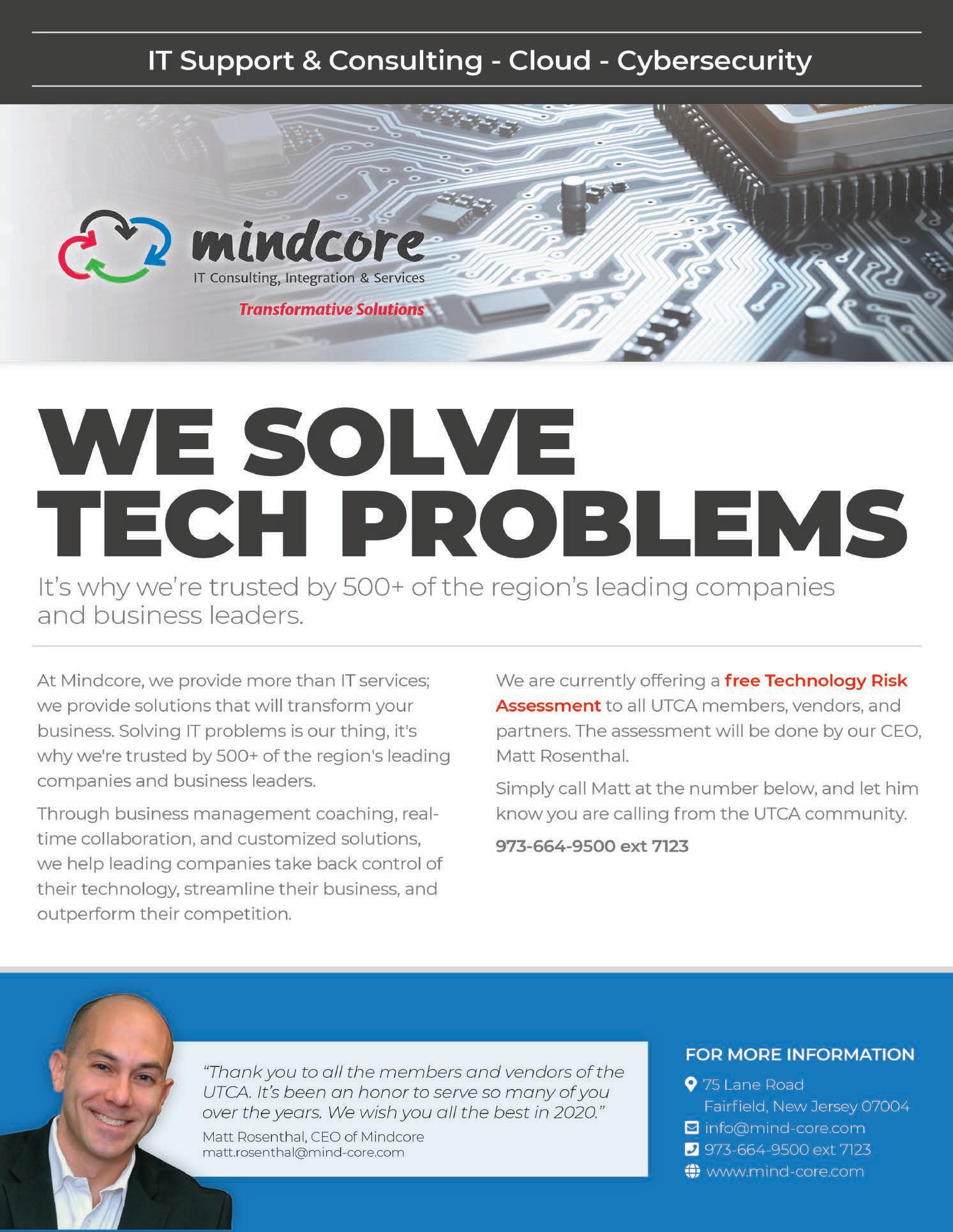
9 minute read
Accounting Corner
Getting stabilized during a black swan
By: jack callahan, cohnreznick
growth, and now I can honestly say I have never seen anything with an impact like COVID-19. This is uncharted ground for us all. Is this a several-week or a few-month pause in work? Will it spark a new burst of positive trendlines? Or will it cause issues and slowdowns? W hen I set out to write this, all was well with the economy and New Jersey utility contracting. For those of you who have heard me talk about strong backlogs and great stimulus at recent events, I did hedge about the potential for a black swan.
Sadly, that swan has taken the form of COVID-19. The effects of this are certainly undetermined now, but it already is disrupting some construction sites with shutdowns, and other states are either enacting or considering issuing other stoppages for largescale sites. We all hope that the downturn is temporary and that the events of early March will help to advance a federal infrastructure bill.
Once COVID-19 became a business disruption reality, we mobilized as a construction practice and generated ideas and initial thoughts on what contractors need to be thinking about. We also have pushed out numerous communications about the latest from the government as well as developed resources to help you strategize through the COVID-19 emergency. These are all found on our firm’s resource center.
It is critical to monitor relief bills and tax updates from the government. In recent days, the Small Business Administration committed to issuing Economic Injury Disaster Loans for up to $2 million in assistance (www.sba.gov/disaster). We all are hearing of other governmental assistance programs.
Before this all began, I was going to write that I am certain that in my 40 years in this industry, I have not seen an expansion that hasn’t contracted within 10 years. Well, we went 11 years with

For our construction contractor clients, we want to provide the following thoughts and potential action items for immediate consideration due to the crisis:
1) Cash is and always will be king. You will need to assess your current cash position and keep a very close eye on accounts receivable collections, timing of accounts payable payments, and effective utilization of your line of credit. You need to model out your cash flows weekly, monthly, and quarterly to identify and understand your liquidity situation. There will be opportunities here if you effectively manage your cash.
2) You will need to develop and/or review your wind-down strategy to determine how quickly and in what areas you can cut overhead in the event of work stoppages. Labor shortages have been a critical concern in this strong economy. You need to assess how best to reduce overhead and communicate these reductions in such a way that you won’t lose your key players who will be needed upon resumption of full operations. What other obligations can be extended or adjusted?
3) Labor management will be critical. You need to know from your labor counsel how to manage furloughs effectively. A recently passed coronavirus relief act includes paid sick leave and family leave that could substantially impact all of you. See the attached AGC discussion. Timely and honest communication will be necessary to minimize the impact.
4) Review critical external commitments. Talk to your banker, talk to your surety agent, talk with your insurance agent, and talk with your legal representation. Nearly every state, New Jersey included, has pending legislation that would force business interruption insurance to cover COVID-19 disruption. Know all your requirements and deadlines and be sure to miss no commitments without effective communication.
5) Site security. The City of Boston recently shut down construction sites, giving contractors limited notice. You need to have contingencies in place to shut down a construction site quickly and effectively. Secure equipment, safely store cranes and heavy machinery, and collect materials and small tools. Government shutdowns will not stop the criminal element from targeting your unmanned sites.
6) Refamiliarize yourself with your contract clauses, specifically those with owners, subcontractors, and suppliers. Understand required notices that must be given and procedures that must be followed to best protect your company’s position in the event of a claim.
While there is so much more to consider and so many actions to be taken, we hope that this short list will start conversations among your internal team and your trusted advisors.
Amid and beyond this initial COVID-19 climate, here are ongoing considerations to help you put your company in a position to succeed.
The time to plan for tough times is now. While backlog is strong and cash flow is positive, you need to be taking a hard look at your business. As you plan your year-end financial wrap-up meetings with your accountants, look past the current reported results and obtain a gauge on your preparedness.
Have you… • Invested in your people? • Invested in technology? • Shown strong cash management skills? • Surrounded yourself with a strong team of independent and knowledgeable advisors? • Established strong and trusted banking and surety relation- ships? • Shown restraint in growth of overhead? • Shown the ability to forecast and plan? • Established clear succession plans? • Invested in client relationships where you are viewed as a con- tractor of choice? • Built up significant book to tax deferrals?
These are just some of the critical factors that you will need to assess as you look at your long-term viability to succeed and thrive in a down market. When markets turn, contractors close shop, retract, or implode at the same time that work will need to be built and work outs will be occurring. The well-positioned contractor with the correct team around them can be well-situated to grow.
If you are not able to assess your preparedness favorably, begin this process before it is too late to take effective remedial actions.
First and foremost are your people. Keep in mind that the industry universally is citing an aging workforce and labor shortages as major concerns. The best-in-class contractors have invested Along with investment in people is investment in technology. The new-age workforce demands access to technological tools that allow them to spend less time on remedial labor-intensive tasks. Between a tech-savvy environment and one mired in ledger sheets, the choice will be clear.
Further, as you have grown and prospered, have you invested in strong cash-management skills? Have you been meticulous in cash collections and timely subcontractor and supplier payments? Have you established sound cash forecasting that is built into your estimating and bidding process? This is now essential given current events. Best-in-class subcontractors and suppliers will look to work with and provide best pricing to contractors who treated them well.
I have always contended that successful contractors have surrounded themselves with a strong team of core trusted advisors such as accountants, attorneys, insurance agents, sureties, and bankers. Evaluate the strengths of those individuals.
While all the trusted advisors are critical to success, the banking and surety relationships can often have the biggest immediate impact. We have experienced down markets where banks have redlined the construction industry. Sound-performing contractors have been told to close their accounts and move all banking relationships without notice. These types of actions can certainly be repeated. Less reactionary but just as critical is having surety relationships with a track record of trust and reliability. There will be a bad job or a bad year. If the relationships are strong and you are trusted, more times than not the surety will support you.
Overhead is always a major concern for a contractor. You need to properly identify what your overhead is and know what your breakeven numbers are. When times are good, margins are strong, and volume is growing, overhead management may not be critical. I can assure you that it is, and the evidence lies in the bottom line. If the growth of the overhead has been inconsistent with volume growth, you need to determine if you have the ability and willingness to correct that change quickly enough.
Forecasting and budgeting are vital to a contractor’s success. Do you have a solid forecasting system that is reliable and responsive? In addition to cash flow, closely monitor labor, production, material delivery, and backlog runoff. Reacting to what happens each day or planning week by week is just not acceptable in this challenging environment.
Careful and thoughtful succession planning has been the key to all mature contractors. Have you taken a hard look at where you want to go with the business? Is family succession or key employee succession an option? If the desire is to sell the company, any type of succession transaction and plan will take time, so see that you have things positioned to minimize the disruption of operations should a buyout event occur or be required.
and paying employees, subcontractors, and suppliers fairly and promptly, you will likely have developed a loyal customer base. If your background is to be a low bidder, to push hard on subcontractors and suppliers, and to have an extended track record of claims, change orders, and extras, you may not be looked upon as a preferred vendor. In times of tightening markets, those pure low bid contractors have proven to be the ones who lose work.
Understand what your book-to-tax deferrals are and be certain to plan when these will turn and how those deferred taxes will be paid. As the market tightens and volumes shrink, it is likely that these deferrals will begin to turn around. Think about the cash flow impact of shrinking volume, shrinking margins, and significant cash flow needs to pay taxes; we have seen it take its toll. In the past, contractors were able to carry back losses and obtain refunds of previously paid taxes. The Tax Cuts and Jobs Act of 2017, while providing more favorable tax rates, took away a contractor’s ability to carry back losses. In prior recessions, these tax refunds were often used as a lifeline to get through a crunch, but that option is no longer available. Be sure to ask about the deferrals and obtain a plan for handling them.
Even when the market is strong, the action points I have laid out are important to your success. Now that things have turned, they will be critical to your survival. In the past, we have seen the construction market impacted a year or more after a market correction, but clearly the effects of this virus are immediate. It is never too soon to have these discussions and, now that a black swan has landed, take this newly found time available and use it wisely.












